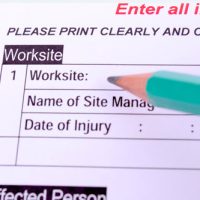Importance Of Documentation For Your Vermont Workers’ Compensation Claim

After suffering a work-related injury in Vermont, you can file a workers’ compensation claim and recover benefits from your employer’s insurance company. That, you probably already knew. However, you may not know that it can get complicated after you file your workers’ compensation claim. Getting your employer’s insurance company to approve your claim can be challenging. Among the things that can make things less complicated and make getting your claim approved less difficult is proper documentation. Below, we discuss how proper documentation can help you with your Vermont workers’ compensation claim and some types of documentation that can prove helpful in your workers’ compensation claim.
Importance of Documentation for Your Workers’ Compensation Claim
The workers’ compensation system is a no-fault one. This means that when filing a workers’ compensation claim, you don’t need to prove negligence as you would in a personal injury claim. Workers’ compensation benefits are paid regardless of who was at fault. This is true even in Vermont. However, you must prove several other things before you can recover workers’ compensation benefits. For instance, you must prove that you had an employer-employee relationship with your employer at the time of your accident. You must prove that you informed your employer of your injury within the required timeframe. In Vermont, you must report a work injury immediately or as soon as possible. You are also required to prove that your injury happened within the course of your work and the severity of your injury. The key to proving this is proper documentation.
Types of Documentation That Can Prove Beneficial in Your Workers’ Compensation Claim
After suffering a work-related injury, it is vital that you gather as much relevant documentation as possible. That said, the following are some of the types of documentation that are often useful to injured employees;
- Accident reports: After you report your work injury to your employer, they will write a report. You should get a copy of this report. Also, if you report your accident to the police and they write up an accident report, ensure you get a copy of the report.
- Medical records: When it comes to medical records, it is advisable that you collect records from before and after your injury. Your medical records can help you prove which part of your body was injured and how severe your injury is.
- Medical receipts: These are crucial for showing how much you have paid out-of-pocket to treat your work-related injury.
- Employment records: Employment records can help you prove that you were a covered employee at the time you suffered your injury and not another kind of worker not covered under the workers’ compensation system. For instance, in Vermont, the workers’ compensation system does not cover independent contractors. Employment records can help you prove that you are not an independent contractor.
- Witness statements: Statements from colleagues or other people who saw what happened can help you prove that you suffered your injury in the course of work.
- Your personal statement: Notes you write down as soon as your accident happens can prove quite beneficial in your workers’ compensation claim.
When it comes to statements (both your statement and statements from others), it is crucial that you do the documentation as early as possible. Remember, as time passes, memories fade, and details become confusing.
Legal Help Is Available
Our skilled Vermont workers’ compensation attorney at Sluka Law PLC can help you file a workers’ compensation claim after a work-related accident. Do not hesitate to contact us.
Source:
forbes.com/advisor/business-insurance/workers-compensation-insurance/#:~:text=Workers%20comp%20benefits%20are%20paid%20no%20matter%20who%20was%20at%20fault
